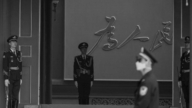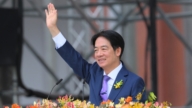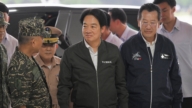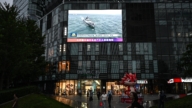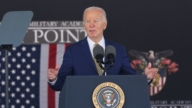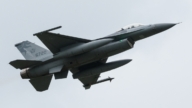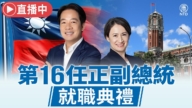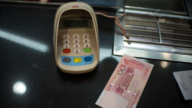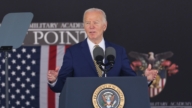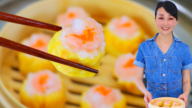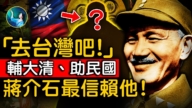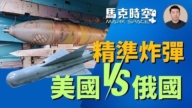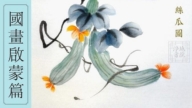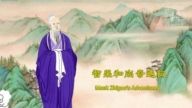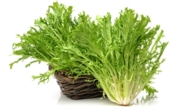【新唐人2012年5月11日訊】菲律賓與中國大陸針對南海黃岩島的主權爭議不斷升級。大陸當局一方面對菲律賓進行嚴厲指責,一方面不斷增兵恐嚇。日前,中方又開始對從菲律賓進口的水果加強檢驗。這被外界解讀為中方意圖通過經濟手段,迫使對方在南海問題上讓步。下面請看本臺記者的報導。
最近,大陸國家質檢總局網站登出一則通知,說,各地檢驗機構多次從菲律賓進口水果中截獲有害生物,要求各地檢驗檢疫機構對菲律賓水果加強檢驗,加大開箱和抽查比例。
這一通知是5月2號發出的,8號在質檢總局網站發佈。這也是中國近期第二次要求加強檢驗從菲律賓進口的水果。
《美國之音》報導指出,這是大陸當局典型的用經濟手段對政治施壓的做法,日本和台灣也都曾經受到類似的經濟脅迫。
菲律賓「香蕉種植與出口商協會」主席安蒂格對媒體表示,已經有一批出口到中國的香蕉沒有能夠通過中方檢驗。安蒂格認為,「黃岩島對峙事件」導致中方實施更嚴格監管,菲律賓的龐大香蕉產業可能會因此受到重創。
據了解,中國是菲律賓目前最大的香蕉進口國。菲律賓每年出口7500萬箱香蕉,其中一半以上賣給了中國。 2011年雙邊貿易額突破300億美元,創下歷史新高。
中國與菲律賓在南海黃岩島海域因為主權問題而發生的對峙,已經持續1個多月。最近一個星期,黃岩島附近的中國船只從14艘迅速增加到33艘。大陸外交部副部長傅瑩也向菲律賓發出措辭嚴厲的警告,聲稱中方「做好了應對菲方擴大事態的各種準備」,大陸官方媒體則恐嚇菲律賓「長此以往,終有一戰」。
對此,時事評論員橫河向《新唐人》分析指出,實際上,中共根本不關心所謂的領土主權,比如,通過對越南作戰得到的領土,轉眼就又送給越南。中共只是慣於利用外部事件來淡化國內的統治危機。
橫河:「就是說,在國內政局不好的情況下,對中共的統治很不利的情況下,或者是危機的情況下,那它確實需要用一些東西,一方面來轉移注意力,另一方面,它一打仗就可以以某種緊急狀態,使得國內的一些活躍人士就不能再說話。」
橫河表示,當年鄧小平下令對越南開戰,就是要通過戰爭來鞏固地位和政權。而現在與中越戰爭不同的是,中國並不善於海軍作戰,一旦開戰必須速戰速決,因此大陸當局很難做出決定。
橫河:「因為只要戰事一拖,對它的統治馬上造成巨大威脅。因為它本來是想用這個民族主義來掩蓋它的統治危機的,但是戰爭一旦打起來,不能夠速戰速決,不能夠取得一個能夠交代的勝利的話,那就會加速它的危機。」
「英國廣播公司」《BBC》報導,菲律賓國防部長蓋茲敏9號表示,在華盛頓會談中,他獲得保證:如果南海爆發衝突,美國將根據1951年簽署的《美菲共同防禦條約》保護菲律賓。
原紐約州立大學教授謝選駿:「如果中國跟菲律賓發生武裝衝突的話,那就意味著它會和南海其他國家發生類似的衝突,最後會把美國捲進來。如果把美國捲入爭端的話,它就會遇到很大麻煩了。美國就會和南海其他國家聯合起來,形成一個軍事同盟。」
謝選駿認為,當局很可能只是假裝要發生武裝衝突,以此來壓制國內持不同政見的人士。但實際上,中共不敢對外動武。
採訪/常春 編輯/李謙 後製/孫寧
************************
South China Sea Confrontation Continues, Chinese Regime applies Economic Pressure
The dispute between the Philippines and mainland China
over the sovereignty of Huangyan Island continues to escalate.
The mainland regime continues to criticize the Philippines and
is increasing military build-up in the area.
Recently, the regime also started to apply strict inspection of
fruits imported from the Philippines.
Many suggest that the Chinese regime is trying
to force Philippines to back away through economic pressure.
Recently, mainland China’s state Administration of Quality
Supervision posted a notice to its website,
saying that they had detected harmful substances in fruits
imported from the Philippines and requested that
local Quality Supervision agencies strengthen inspection of
fruits from the Philippines.
The notice was announced on May 2,
and posted to the website on May 8.
This is the second time that China has requested strengthening
the inspection of fruits from the Philippines in the recent period.
Voice of America reported that this is a typical method that
the mainland regime uses to apply economic and political pressure,
Japan and Taiwan have also suffered
such economic threats in the past.
The Chairman of the Philippine’s Banana-Growers and
Exporters Association Stephen Antig told media,
some bananas exported to China have already failed inspection.
Antig believes, the Huangyan Island incident caused the Chinese to strengthen inspection.
This might cause a major blow to the giant banana industry in
the Philippines.
According to sources, China is the largest importer of
bananas from the Philippines.
The Philippines export more than 75 million crates of bananas,
more than half is sold to China.
In 2011, the total bilateral trade between the two countries
exceeded 30 billion U.S dollars, the highest point yet reached in history.
The China-Philippines confrontation has persisted
for more than one month.
In the past week, Chinese shipping near Huangyan island
has increased from 14 to 33 ships.
The Chinese regime’s Deputy Foreign Minister Fu Ying
has already warned the Philippines that,
China is “prepared for any Philippines attempt
to expand the issue.”
Mainland Chinese media threatened that,
“if the situation continues, it will eventually lead to war.”
Regarding this, social commentator Henghe told NTD that,
in reality, the Chinese Communist Party (CCP) does not care about sovereignty disputes,
they will take the island from Philippines and
give it to Vietnam right away.
The CCP is trying to use foreign conflicts to cover up
it’s own internal crisis.
Henghe, “That is to say, when the situation in China is bad,
very unfavorable for the CCP rule, or during a crisis,
the CCP needs something to divert attention.
On the other hand, fighting a war will cause an emergency
situation, which will force some active people in China to stop talking.”
Henghe expressed, back when Deng Xiaoping ordered war with
Vietnam, it was to consolidate his status and ruling authority.
The only issue is, the CCP is not good at naval war,
so if war needs to be fought quickly, then the regime will face some hard decisions.
Henghe, “If the war drags on,
then it will cause a major threat to CCP rule.
It wishes to use this patriotic action to cover up
the political crisis,
but if the war starts and doesn’t end quickly, or it can’t
get a definitive win, then that will accelerate the crisis.”
British media BBC reported, while meeting in Washington
on May 9, Philippine Defense Secretary Gazmin received support from the U.S.
If war breaks out in the South China Sea, the U.S will protect
Philippines according to the US-Philippine Mutual Defense Treaty of 1951.
Former New York State University Professor Xie Xuanjun
expressed, “If China starts an armed conflict with Philippines,
then it means it will have similar conflicts with other South China Sea nations, eventually dragging the U.S into this conflict.
If the U.S gets involved, it (CCP) will face major issues.
The U.S will form a military alliance with other South China Sea nations.”
Xie Xuanjun also believes, the Chinese regime is trying
to use the armed conflict to silence dissidents within the country.
In reality, the CCP will not dare to go to war.


